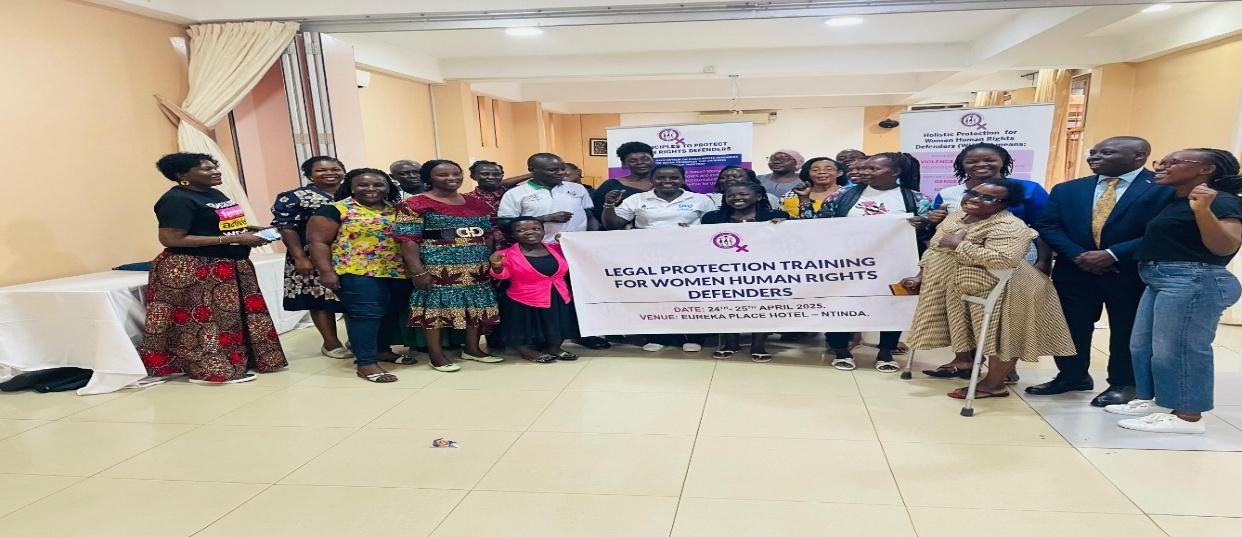“We cannot protect what we don’t understand.” These were the opening sentiments shared by Brenda Kugonza, Executive Director of the Women Human Rights Defenders Network Uganda (WHRDN-U), as she launched a groundbreaking two-day Legal Protection and Compliance Training on April 24–25, 2025. The training brought together 24 Women Human Rights Defenders (WHRDs) from across Uganda and was facilitated by legal expert Anthony Masake, Executive Director of Chapter Four Uganda.
The initiative aimed to bolster the legal knowledge and compliance capacity of WHRDs, ensuring their continued resilience amidst an increasingly restrictive civic space.
Why Legal Compliance Matters for WHRDs
In her opening remarks, Brenda shared the sobering story of a WHRD whose organization was shut down over legal noncompliance, resulting in serious personal repercussions. “We cannot allow such stories to repeat. Understanding the law is part of our protection and sustainability,” she emphasized.
With Uganda’s legal landscape rapidly shifting, the training set out to:
- Raise awareness on legal obligations for NGOs.
- Explore practical strategies for addressing compliance challenges.
- Strengthen collective advocacy around civic space and operational freedoms.
Key Discussions and Regional Realities
Participants shared pressing legal and operational issues based on their regional contexts:
- Central Uganda: Questions ranged from NGO registration requirements, tax return errors, and anti-money laundering policies, to handling URA/KCCA notifications and complex donor compliance issues.
- Western Uganda: Concerns included lack of capacity among Boards, frequent changes in registration requirements, corruption, and pressures to disclose funding sources before signing MOUs.
- Eastern Uganda: Issues raised included district-level legal fees, registration denial due to organizational objectives, confusion around filing deadlines, and complexities surrounding founder member succession.
- Northern & West Nile: WHRDs discussed risks tied to tax exemptions, district-level MOU pressures, and community resistance due to the nature of their human rights work.
The diversity of experiences showcased just how varied — and often challenging — the legal terrain is for WHRDs, especially those working in remote or underserved areas.
Expert Insights and Legal Navigation Tools
Facilitator Anthony Masake provided tailored responses and legal guidance. Key takeaways included:
- NGO Registration & Tax Compliance: Participants were urged to adhere strictly to URSB checklists and to file tax returns by the 10th of each month to avoid penalties. Tax exemption is beneficial but may trigger audits.
- FIA & Anti-Money Laundering: While NGOs are exempt from FIA registration as of February 2025, they are still advised to maintain Anti-Money Laundering policies.
- MOUs with Districts: Signing MOUs with local governments is not a legal requirement. WHRDs were advised to critically assess risks before entering into such agreements.
- Data Protection: A deep dive into Uganda’s Data Protection Policy helped participants understand roles of Data Controllers, Processors, and Officers. Annual registration with the Data Protection and Privacy Office (DPPO) is mandatory, and organizations were encouraged to assign management-level DPOs.
Understanding the NGO Bureau’s RIA Report
Day Two introduced participants to the Regulatory Impact Assessment (RIA) report , a policy document that outlines the government’s expectations for NGO operations. Among other things, the report advocates:
- Reducing administrative costs in favor of direct service delivery.
- Employing qualified professionals to establish NGOs.
- Screening foreign donors.
- Hiring full-time compliance officers.
While informative, the RIA report sparked concern. “It focuses too much on our shortcomings and too little on our contributions,” noted Sarah Namugolo. Participants warned that if used selectively, the RIA could further restrict civic space and undermine NGO impact.
Data Protection: A Critical Compliance Frontier
The training concluded with an intensive session on data protection. From defining personal data to understanding the responsibilities of a Data Protection Officer (DPO), participants gained critical insights.
Notably, Annet Alubo shared a cautionary tale of how her personal data was misused by a consultant to register another NGO. This testimony underscored the urgent need for robust data protection measures in the sector.
Participant Reflections & Commitments
WHRDs left the training energized and equipped with practical action plans. Highlights include:
- Jackline Namono committed to registering her CBO with URSB and restructuring her Board.
- Jovia Oyungi planned to train her colleagues on data protection principles and begin registration with the DPPO.
- Rita from MADNET resolved to rebrand her organization and draft a data protection policy.
- Hope Atim appreciated learning how to communicate with URA in case of delayed payments.
- Florence Namuga and Nabiira Nakalema were among many who expressed gratitude for learning how to navigate compliance with confidence.
Key Achievements
- Deepened understanding of legal compliance frameworks including registration, taxation, and data privacy.
- Cross-regional solidarity through shared experiences and peer learning.
- Tangible action plans to address compliance gaps and improve legal resilience.
Next Steps
WHRDN-U and Chapter Four Uganda committed to continued support, including:
- Organizing a specialized tax compliance training.
- Sharing legal templates (e.g., URA correspondence letters, DPO job descriptions).
- Facilitating ICT-focused training through the DPPO.
- Coordinating collective advocacy around the NGO Bureau’s RIA report.
- Mapping WHRDs in environmental rights work for targeted support.
Conclusion: Building Legal Power for Women Defenders
The Legal Protection and Compliance Training reaffirmed WHRDN-U’s commitment to equipping WHRDs with the knowledge and tools needed to not just survive — but thrive — in Uganda’s legal and civic landscape. By fostering collective resilience and compliance literacy, WHRDN-U is ensuring that WHRDs remain empowered to defend rights, challenge injustice, and lead transformational change in their communities.
PICTORIAL OF THE TRAINING









